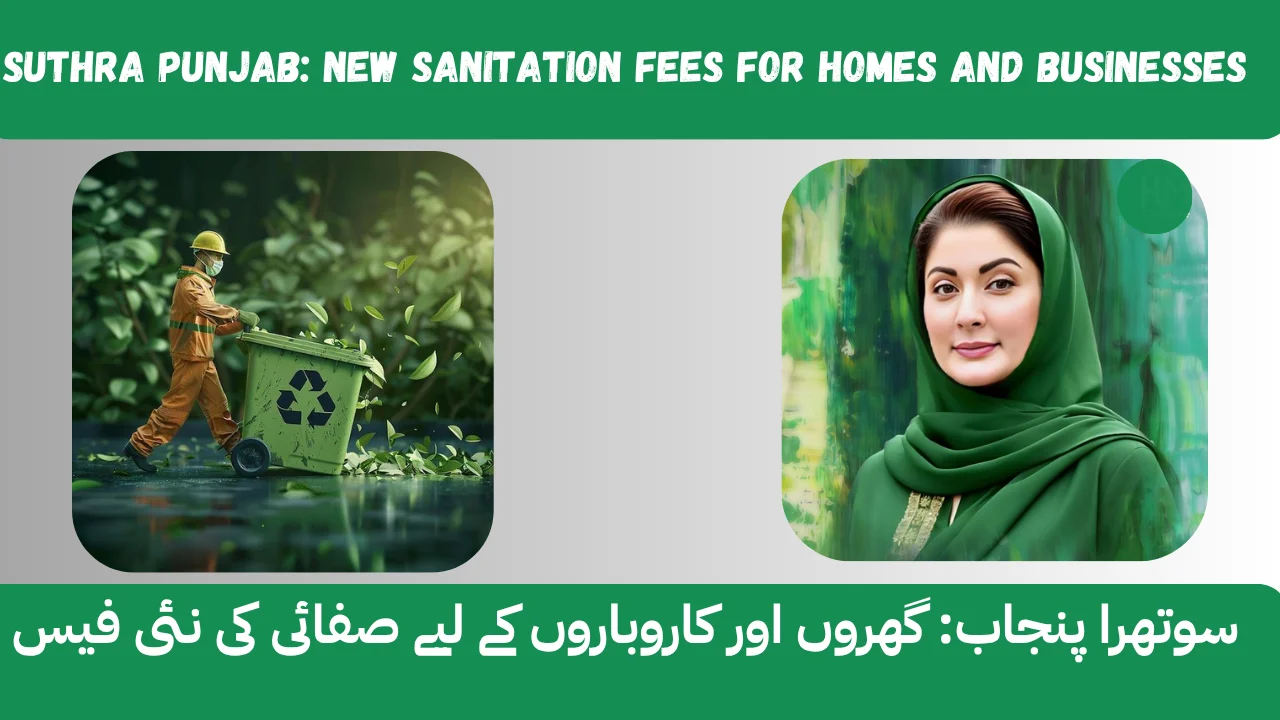Suthra Punjab: New Sanitation Fees for Homes and Businesses
The Suthra Punjab initiative aimed at modernizing waste management and cleanliness throughout Punjab on a large scale. The introduction of a cleanliness fee was implemented to ensure its sustainability. It was inaugurated on December 3, 2024. The Punjab government is enhancing its significant Suthra Punjab (“Clean Punjab”) program by launching a monthly sanitation fee—essentially a “cleanliness tax”—for both residential and commercial properties in urban and rural regions. This phased implementation aims to provide sustainable funding for waste management and guarantee cleaner environments for all residents.
Know more about: Latest Pakistan Satellite Launch

سوتھرا پنجاب اقدام کا مقصد پورے پنجاب میں بڑے پیمانے پر ویسٹ مینجمنٹ اور صفائی کو جدید بنانا ہے۔ اس کی پائیداری کو یقینی بنانے کے لیے صفائی کی فیس کا نفاذ عمل میں لایا گیا۔ اس کا افتتاح 3 دسمبر 2024 کو کیا گیا تھا۔ پنجاب حکومت شہری اور دیہی علاقوں میں رہائشی اور تجارتی املاک دونوں کے لیے ماہانہ صفائی فیس — بنیادی طور پر ایک “صفائی ٹیکس” — شروع کرکے اپنے اہم سوتھرا پنجاب (“صاف پنجاب”) پروگرام کو بڑھا رہی ہے۔ اس مرحلہ وار نفاذ کا مقصد فضلہ کے انتظام کے لیے پائیدار فنڈنگ فراہم کرنا اور تمام رہائشیوں کے لیے صاف ستھرا ماحول کی ضمانت دینا ہے۔
Fee Structure
Residences
- Rs 300 per month for houses up to 5 marla
- Rs 500 for up to 10 marla.
- Rs. 1,000 for 10 marla to 1 kanal.
- Higher fees—up to Rs. 5,000 for larger properties.
Businesses
- Rs. 500/month for small businesses
- Rs. 1,000 for medium
- Rs. 3,000 for large.
Rural Areas
- Houses Rs. 200/month for 5-10 marla
- Rs. 400 for larger.
Implementation and Timeline
Phased rollout: Urban/commercial zones first, followed by smaller and rural zones in later phases
Current Status: Cabinet approval has already been granted. It may take a few months to enforce it.
Scale of Impact
- This charge is going to be a big earner, anywhere between Rs 15 billion during the first year, up to even Rs 68 billion-
- A previous 2024 proposal from Dunya News projected Rs 22 billion via a sanitation tax targeting commercial properties
Policy Reasoning
- Sustaining and scaling up the Suthra Punjab campaign, modernized tools, outsourced cleaning services, and the cleanliness drives across the province.
- Enhances the sustainability of waste management as well as infrastructure improvement.
Elicitation from Citizens & Controversy
- This has drawn massive pushback from citizens who see it as nothing but undue financial pressure on households, especially the low-income ones.
- Lavish state spending on official perks rather than public services, such as cleanliness, has drawn the ire of civil society.
- Challenges are already being worked out in some parts, for instance, in Rawalpindi.
Objectives & Digital Modernization
The sanitation fee is in line with Suthra Punjab’s goal of achieving long-term sustainability, which seeks to:
- Support comprehensive door-to-door waste management services in both urban and rural regions, transitioning towards a self-sustaining model.
- Enhance operations by implementing digital billing systems that will gradually phase out printed statements, thereby increasing transparency and efficiency.
- Utilize adequate sanitation facilities and personnel, including the allocation of one sanitation worker for every 250 households, with digital monitoring of their performance.
Public Response & Concerns
The implementation has sparked significant public anger, especially among low-income families and small enterprises:
- Residents express that the sanitation fees are oppressive, particularly for those already facing financial difficulties. Advocacy groups have called for a reevaluation of government spending rather than adding further financial strain on the public.
- Critics have voiced concerns regarding extravagant expenditures in other government sectors (for example, alleged excessive spending on office supplies) and contend that these funds should be redirected toward sanitation initiatives.
- Legal actions are on the rise—advocates, including representatives from bar associations, are ready to bring the issue to court.
Conclusion
The cleanliness fee by the Punjab government reflects its ambition for sustainable urban management and environmental responsibility. Though the fee is supposed to galvanize resources critically needed in fulfilling the support infrastructure of waste collection and general sanitation, citizens have mostly described it as another avenue of imposing an extra burden on them. For transparency, public awareness, and sensitivity toward such low-income households to be achieved, this initiative would fly. As the Suthra Punjab is being implemented, the government should ensure that an adequate balance between fiscal objectives and social equity is attained.
پنجاب حکومت کی جانب سے صفائی کی فیس پائیدار شہری انتظام اور ماحولیاتی ذمہ داری کے لیے اس کے عزائم کی عکاسی کرتی ہے۔ اگرچہ فیس کو کچرے کو جمع کرنے اور عام صفائی ستھرائی کے سپورٹ انفراسٹرکچر کو پورا کرنے کے لیے ضروری وسائل کو بڑھانا ہے، لیکن شہریوں نے زیادہ تر اسے ان پر اضافی بوجھ ڈالنے کا ایک اور ذریعہ قرار دیا ہے۔ شفافیت، عوامی بیداری، اور ایسے کم آمدنی والے گھرانوں کے تئیں حساسیت کے حصول کے لیے، یہ اقدام اڑ جائے گا۔ جیسا کہ سوتھرا پنجاب لاگو کیا جا رہا ہے، حکومت کو اس بات کو یقینی بنانا چاہیے کہ مالیاتی مقاصد اور سماجی مساوات کے درمیان مناسب توازن حاصل ہو۔
FAQ’s
How much is the cleanliness fee in Punjab?
It ranges between Rs 200 to Rs 5,000 depending on the size and type of property.
Who has to pay the fee?
Property owners, residential as well as commercial, throughout Punjab
When will the fee be implemented?
Implementation will start in phases after cabinet approval.
Why is the government charging this fee?
To fund waste management services as well as enhance cleanliness in both urban and rural areas.